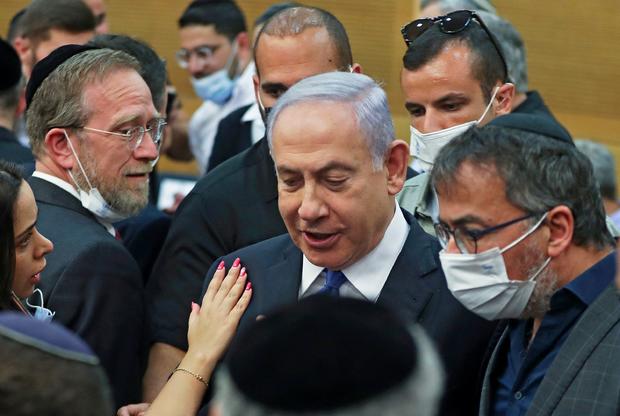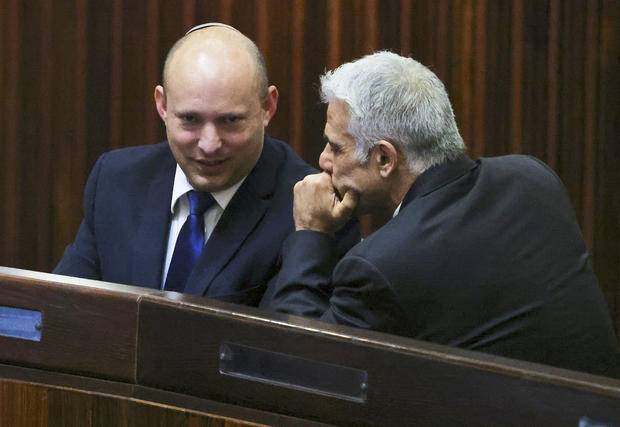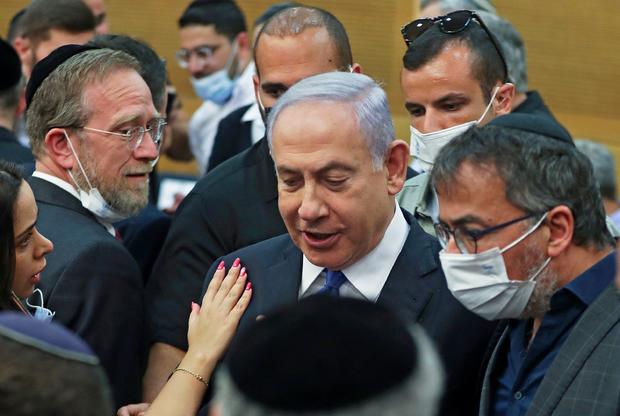Tel Aviv, Israel — Prime Minister Benjamin Netanyahu’s opponents on Thursday pushed for a quick parliament vote to formally end his lengthy rule, hoping to head off any last-minute attempts by the premier to derail their newly announced coalition government.

The latest political maneuvering began just hours after opposition leader Yair Lapid and his main coalition partner, Naftali Bennett, declared they had reached a deal to form a new government and muster a majority in the 120-member parliament, or Knesset.
The coalition consists of eight parties from across the political spectrum with the shared goal of toppling Netanyahu after a record-setting 12 years in power. The alliance includes hardliners previously allied with Netanyahu, as well as center-left parties and even an Arab faction — a first in Israeli politics.
CBS News senior foreign correspondent Elizabeth Palmer notes that the coalition is fragile at best. It’s made up of a right wing nationalistic leader; an Arab-Islamic party who some members of the coalition would call an extension of the Muslim Brotherhood; and left wing parties who do not oppose Israeli soldiers being tried at the International Criminal Court for alleged war crimes. The only thing that unites them — getting Netanyahu out of office. He’s expected to try every trick in the political book to prevent it.
Netanyahu lashed out at his foes on Thursday, signaling that he will continue to exert pressure on former ideological allies who joined the Lapid-Bennett coalition. “All members of Knesset who were elected with right-wing votes need to oppose this dangerous leftist government,” he tweeted.
The anti-Netanyahu bloc announced the coalition deal just before a deadline at midnight Wednesday. The agreement triggered a complex process that is likely to stretch over the next week.
The coalition commands a razor-thin majority of 61 votes in parliament. Now the question is whether the group’s votes will hold together to name a new parliament speaker. The speaker would preside over a Knesset vote required to confirm the new government.
The current parliament speaker is a Netanyahu ally who could use his position to delay the vote and give Netanyahu more time to sabotage the coalition.
As the Lapid-Bennett coalition was coming together in recent days, Netanyahu and his supporters ramped up a pressure campaign against former hawkish allies, including Bennett and his No. 2 in the Yamina party, Ayelet Shaked.

Netanyahu accused them of betraying right-wing values. His supporters launched vicious social media campaigns and staged noisy protests outside Shaked’s home.
When the deal was announced, anti-Netanhayu crowds danced in the streets, Palmer points out, adding that during the elections in March, they mobilized to highlight that he was on trial for corruption and fraud .
But, Palmer notes, Netanhayu has equally devoted supporters who applaud his nationalist politics and give him credit for Israel’s world-beating COVID-19 vaccination program.
Netanyahu and his backers called a meeting later Thursday to discuss their next steps.
Under the coalition agreement, Lapid and Bennett will split the job of prime minister in a rotation. Bennett, a former ally of Netanyahu, is to serve the first two years, while Lapid is to serve the final two years – though it is far from certain their fragile coalition will last that long.
The historic deal also includes a small Islamist party, the United Arab List, which would make it the first Arab party ever to be part of a governing coalition.
Netanyahu, desperate to remain in office while he fights the corruption charges, is expected to do everything possible in the coming days to prevent the new coalition from taking power. If he fails, he will be pushed into the opposition.
The deal comes at a tumultuous time for Israel, which fought an 11-day war against Hamas militants in the Gaza Strip last month while also experiencing mob violence between Jews and Arabs in cities across the country. The country also is emerging from the coronavirus crisis , which caused deep economic damage and exposed tensions between the secular majority and the ultra-Orthodox minority before the vaccination program was in place.
